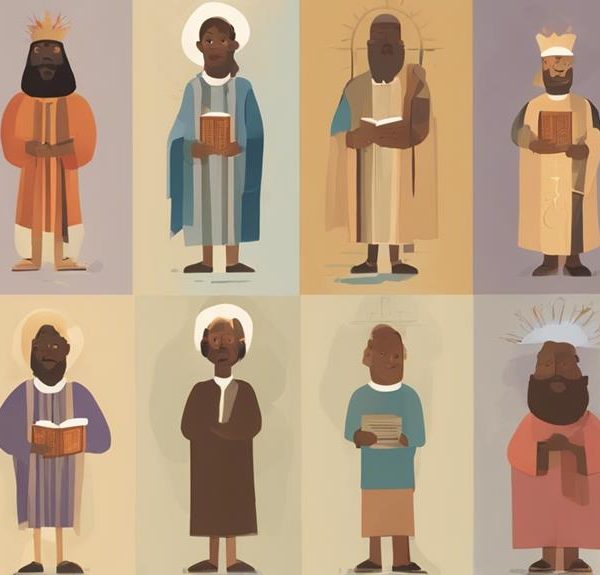Unearth the transformative power of Biblical virtues and discover how they can enrich your life and relationships in profound ways.

List of Virtues in the Bible
Have you ever considered the validity of the concept that virtues such as love, patience, humility, and kindness, as outlined in the Bible, could potentially enhance your personal development?
As you reflect on these virtues, you might find that they offer a moral compass, guiding your decisions and interactions.
How might these virtues, if infused in your day-to-day life, impact your relationships, your career, or your overall sense of fulfillment?
I invite you to explore this riveting topic further and uncover what these Biblical virtues might mean for you.
Key Takeaways
- The Bible emphasizes virtues such as forgiveness, wisdom, love, patience, humility, and kindness.
- These virtues encourage spiritual growth, endurance, and reflection of God's nature.
- Virtues like patience and humility are not just passive traits but demand active engagement and perseverance.
- The Bible highlights the transformative power of virtues, shaping character, relationships, and fostering unity.
Understanding Biblical Virtues

How do you understand Biblical virtues, those moral qualities that the Bible emphasizes and encourages believers to cultivate? You may ponder on the Biblical Virtue of Forgiveness, an action that requires letting go of resentment and thoughts of revenge. It's a divine quality, reflecting God's own forgiving nature, and thus, it's held in high regard in the scriptures.
Understanding the Virtue of Wisdom in Scripture, on the other hand, may require a more introspective approach. Wisdom in the Biblical sense is more than just knowledge or intelligence. It's the ability to discern what's just, righteous, and truthful, applying God's teachings in your everyday life. It's about making choices that align with God's will, even when those choices mightn't seem the most appealing or comfortable.
Love as a Bible Virtue

Undoubtedly, Love stands as one of the most profound virtues highlighted in the Bible, a divine characteristic that's integral to understanding and living out your faith. This Love isn't only a feeling, but also a commitment to others' well-being, a sacrificial giving of oneself, epitomized by Jesus' ultimate sacrifice.
You find Love's Divine Commandments woven throughout scriptures, shaping the moral and ethical backbone of Christianity. Central to this is the commandment to 'love your neighbor as yourself', which encourages empathy, compassion, and selflessness. It's a directive that goes beyond mere affection, involving a deep sense of respect for all of humanity.
Another significant aspect is the Unconditional Love in Scriptures, displaying God's boundless and enduring love for mankind. This love isn't merit-based, nor does it waver based on our actions or failures. It's a steady, unchanging love that secures our worth and dignity.
To fully grasp the magnitude of Love as a Bible virtue, it's essential to delve into its multifaceted nature. It's a love that calls for action, that demands our engagement with others, and that roots us firmly in our faith. It's more than just a virtue; it's a way of life.
The Virtue of Patience

While love represents an essential biblical virtue, patience, an equally significant value, embodies another integral facet of Christian faith and character. This virtue finds its roots in the Greek term 'makrothumia', which translates to 'long-suffering'. Patience, then, isn't merely about waiting but encompasses endurance in the face of trials and tribulations.
Let's examine 'Patience in Prayer', which is a key aspect of Christian spiritual life. The Bible urges you to remain steadfast in prayer, persisting despite apparent delays in God's responses. This patience, embodied in unwavering faith, strengthens your relationship with God, fostering spiritual growth and transformation.
Furthermore, 'Endurance through Trials' epitomizes patience. James 1:2-4 posits, 'Consider it pure joy, my brothers and sisters, whenever you face trials of many kinds, because you know that the testing of your faith produces perseverance.' Here, the Bible encourages you to endure, promising that trials will refine your faith and cultivate perseverance.
Humility in Biblical Teachings

Shifting our focus to humility, another core virtue emphasized in biblical teachings, we find that it's often portrayed as a path towards wisdom and spiritual growth. You'll notice that humility isn't a sign of weakness or inferiority, rather, it's an acknowledgment of one's limitations, fostering a spirit of continuous learning and understanding.
The role of humility in spiritual growth is significant. It facilitates an open-minded approach to learning, enabling you to better absorb God's wisdom. By humbly submitting yourself, you're better positioned to receive spiritual enlightenment and guidance. In essence, humility acts as a conduit for God's grace and blessings.
Humility in Jesus' teachings is also a central theme. Jesus consistently exemplified humility, from washing his disciples' feet to his sacrificial death. He taught that 'whoever exalts himself will be humbled, and whoever humbles himself will be exalted' (Matthew 23:12). This underscores the paradoxical nature of humility in the biblical context: by lowering oneself, one is actually elevated in the spiritual realm.
Kindness: A Biblical Perspective

Diving into the biblical perspective of kindness, you'll find it intricately woven into the fabric of God's expectations for humanity, serving as a moral compass guiding believers in their interpersonal relationships. This virtue, manifested in acts of benevolence, love, and compassion, isn't confined to friends and family alone. The Bible emphasizes kindness towards enemies, a radical and transformative approach that challenges the natural human tendency towards vengeance and hostility.
In the Old Testament, numerous acts of kindness underscore the virtue's significance. Consider Abraham's hospitality towards strangers in Genesis 18, or Boaz's generosity towards Ruth, a foreigner and widow. These instances reveal a profound understanding of kindness as an act of selfless love.
Furthermore, kindness in the Bible isn't merely an individual attribute but a communal expectation. It fosters unity, breaks down barriers, and mirrors God's own kindness towards humanity. From a biblical perspective, kindness is proactive, not reactive. It isn't merely a response to others' actions but a deliberate, intentional effort to embody God's love.
Thus, kindness in biblical teachings is a potent force for good, a virtue that breaks cycles of hatred and fosters a community of love and understanding.
Frequently Asked Questions
How Have the Interpretations of Biblical Virtues Changed Over Time?
You've seen the evolution of Biblical interpretations over time as societal norms shift. Cultural influence on virtues plays a key role in this change.
For instance, virtues like humility and charity have expanded in meaning. Earlier, they were simply about modesty and almsgiving, now they encompass a broader sense of selflessness and generosity.
You'll find that interpretations have become more inclusive, reflecting society's changing values.
Are There Any Contradictions in the Bible Regarding the Virtues?
Yes, you might find contradictions in Biblical Ethics if you're looking strictly at the surface. However, upon closer examination, you'll often find ways of reconciling Biblical inconsistencies.
These seeming contradictions often result from different cultural contexts, authorship, or interpretation over time. It's critical to examine these virtues not just individually, but also within the broader context of the Bible's overarching message of love and grace.
How Can One Incorporate These Biblical Virtues Into Daily Life?
You can incorporate biblical virtues into your daily life by applying practical steps. Begin by understanding these virtues. Then, consciously apply them in your decision-making process.
For example, exercise patience when you're tested, show kindness to others, and uphold integrity in your actions. It's not just about knowing these virtues, it's about living them out.
How Do Different Religious Denominations Interpret These Virtues?
Interpretation variations across denominations influence how you understand biblical virtues. Your denomination's theology and teachings often shape your interpretation.
Additionally, cultural influence plays a crucial role in how these virtues are perceived. For instance, how one denomination views humility might differ from another, influenced by socio-cultural factors.
It's important to understand these nuances when studying religious texts and applying their teachings to your life.
Are There Any Biblical Virtues That Are Less Emphasized or Overlooked in Modern Christianity?
Yes, you'll find that modern culture's impact on biblical virtues has led to some being less emphasized. For instance, virtues like hospitality, simplicity, and contentment aren't as highlighted in modern Christianity.
These forgotten virtues in biblical teachings are often overlooked due to the shift towards individualism and materialism. It's a complex topic that involves cultural, theological, and historical aspects, demanding a more nuanced understanding of biblical teachings.
Conclusion
In sum, you've explored the profound virtues of love, patience, humility, and kindness within biblical context. These aren't just moral guidelines, they're divine instructions for living.
Love teaches you about selflessness, patience refines your character, humility roots you in reality, and kindness expands your compassion. Mastering these virtues isn't easy, but it's a meaningful journey towards spiritual maturity.
So, remember, the Bible isn't just a book – it's a roadmap to a virtuous life.



Sign up